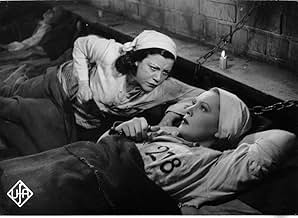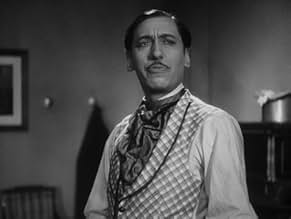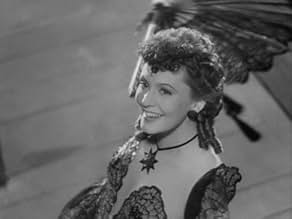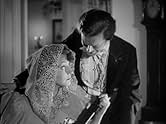In 1846 the actress Gloria Vane is performing at the Adelphi Theatre, London. She is in love with the destitute nobleman Albert Finsbury, who is shortly departing to Australia to become an o... Read allIn 1846 the actress Gloria Vane is performing at the Adelphi Theatre, London. She is in love with the destitute nobleman Albert Finsbury, who is shortly departing to Australia to become an officer in the Queen's regiment. He is supposed to pay his debts before leaving and uses an... Read allIn 1846 the actress Gloria Vane is performing at the Adelphi Theatre, London. She is in love with the destitute nobleman Albert Finsbury, who is shortly departing to Australia to become an officer in the Queen's regiment. He is supposed to pay his debts before leaving and uses an altered cheque to do so. After Finsbury has left, the forgery is discovered. To protect h... Read all
- Director
- Writers
- Stars
- Awards
- 1 nomination total
- Director
- Writers
- All cast & crew
- Production, box office & more at IMDbPro
Featured reviews
"To New Shores" was a 1937 film directed by Sirk when he was still known by his real name, Detlef Sierck. He had directed seven features and three shorts prior to this film, all for the famous German film studio Universum Film AG (or UFA, for short). The history of UFA is dark and controversial, as they became deeply entrenched in the Nazi machine. Prior to the rise of National Socialism in Germany in 1933, UFA had produced some great films, namely the films of Fritz Lang, such as "Dr. Mabuse: The Gambler", "Die Nibelungen", and "Metropolis". When the Nazis came into power, UFA benefited heavily from it. The Nazis' fascist modus operandi extended to the film industry as well, where they essentially made UFA the official film studio of Nazi Germany (UFA churned out the country's propaganda films, including "Triumph of the Will" in 1935), and forced out the other film studios, leaving UFA with little to no competition in the German film industry. Additionally, the Germans' conquering and occupation of so many other countries across Europe was opening new markets to UFA. In a country under German occupation, the influx of cultural materials, such as films, was heavily regulated by the occupying government, so the Nazis could control exactly what films were available to the people of an occupied nation. And, of course, they made sure that UFA's films were everywhere. Put simply, UFA profited immensely from the Nazis' tyranny in Europe during those years. So, naturally, there's often a sense of moral corruption associated with this particular film studio in terms of its complicity with the Nazis during this part of history.
Douglas Sirk, too, could be criticized for his contributions to the Nazi machine. Filmmakers like Fritz Lang and Billy Wilder (a screenwriter at the time) bailed out of Germany upon Hitler's rise to power, while directors like Ernst Lubitsch and F.W. Murnau were already working in America. But Sirk didn't leave, at least not right away. For a time he stayed and worked for UFA and, by extension, for the Nazis. That being said, in 1937 (after this film and one more), he finally left Germany, supposedly because of political sentiments and because of his Jewish wife. It's also worth noting that, when he got to America, he made "Hitler's Madman", and overtly anti-Nazi film.
"To New Shores" stars Zarah Leander, a Swedish singer who apparently was Germany's biggest star actress during the Nazi years, and this, her first film with UFA, was evidently the film that propelled her to stardom (along with Sirk's next film, "La Habanera", which also starred Leander). Admittedly, it's a strong performance. She does quite well.
Interestingly, the propaganda in this film is actually minimal, all things considered. I found myself surprised that the Nazi government let a film be produced with so little propaganda value. Of course, it was 1937, and the war hadn't begun yet, but still, there's not much here in terms of propaganda. The film is a criticism of social injustice, like much of Sirk's work seems to be ("All That Heaven Allows" is the main example that comes to mind, though, as I said, I haven't seen many of his films). Presumably in order to get the film past the censors, Sirk had to set the film in England, and so all the characters are English, despite speaking German. As a result, the social injustice and cultural decadence depicted in the film can be seen as a criticism of English society specifically, which I'm sure is what the censors were counting on when they passed the film. I do not think, however, that this is how Sirk intended the film to be interpreted. I think Sirk was concerned with social injustice in general and, if anything, in Germany specifically, although he could obviously never convey that kind of message under the strict regulation of the Nazi censors. Nevertheless, much of the cultural criticism in the film has far more implications for Germany than it does for England, and the prison camp to which the female protagonist is sent will inevitably evoke associations with Nazi concentration camps during the war.
Watching "To New Shores", I was reminded very much of Roberto Rossellini's 1942 film "A Pilot Returns". Both films were made in collaboration with the fascist government that ran their respective countries. Furthermore, the films are very similar in style and tone. "To New Shores" has much less in common with the German cinema of the '20s and even early '30s than it does with, for instance, the concurrent French poetic realism films by directors like Marcel Carné, Jean Renoir, and Julien Duvivier.
Overall, it's a quality film with solid entertainment value and a fairly engaging narrative. I never expected that UFA would have churned out a real film like this in the years just before the war. In comparison to Sirk's later work in Hollywood, "To New Shores" lacks both the stylized aesthetic and the intense melodrama that marked those films. It's definitely a melodrama, but it's more subtle and understated than films like "All That Heaven Allows" and "Magnificent Obsession". It's not great cinema, but it's a respectable effort that is probably well worth the watch.
RATING: 6.67 out of 10 stars
The story is very melodramatic but not very convincing. A man makes bad use of his fathers money for the sake of a Vaudeville singer. She is therefore sent to Australia for imprisonment. The man joins the army and they meet again...
Nevertheless you will recognize some elements of Sirk's later cinematography also in this movie, like the frequent use of mirrors an element which was later adapted by his great admirer Fassbinder). A ridiculous element of Nazi censorship is the fact that the dancing girls are forced to dance to a mock version of Offenbach's Can-Can.
Most aspects appear to be authentic here and delivered in a fragile manner by the cast but there are actually, to this day, two people who make their portrayals worth deeper analysis: Willi Birgel as Sir Albert and Zarah Leander as Gloria Vane. Let me make some points about them before I move to the artistic aspect of the movie.
As a matter of fact, this is a movie which made the Swedish actress a star at Ufa Studios after her first German film PREMIERE (which was not at Ufa). A debut at the studio and a true ZARAH LEANDER film at first sight. As a newcomer at the time (1937), she makes her entrance as an artistic personality, a character capable of loving and waiting, a suffering 'product to identify with' for female audiences bringing to light certain mechanisms of social hypocrites (mind you that the story is not set in Germany in order not to evoke some controversial interpretations or misunderstanding but... in England and, foremost, in Australia – the safest choice of locale seen as a 'new land'). She is a character of a typical woman of her films, echoes certain features widespread at the time bringing everything to pinnacle of melancholy. The Paramatta sequence as well as the trial accurately address the social conventions and question their morality. It is, however, foremost afflicted and influenced by women's emancipation, women's rights - a handkerchief for sensitive female viewers necessary. Here, Zarah's Gloria Vane draws parallels to many femme fatales of the time, including ROMANZE IN MOLL or DER WEG INS FREIE (Way To Freedom) which clearly draws parallels to this film along with its title. More to say, the camera seems to celebrate her face (as it was in case of Garbo at Hollywood). And yet...Zarah is twice an artist: with her deep voice, she does not play so memorably as she sings memorably (I will develop this aspect with music of the film).
It is, however, not the woman who suffers most and jerks our tears to the very end. It is Sir Albert, a seemingly noble man of prospects in life, of promising marriage with beautiful Mary and, despite everything, a character of strong personal conflicts, destructive torments. Willi Birgel, being Zarah's favorite co-star, delivers a unique portrayal of shadowed character never remaining in the shadow of our attention. Although we mostly see him from her pretentious perspective, the actor manages to draw a vibrant personality. Now let me move to general artistic merits of the film.
Great cinematography supplies a viewer with exceptional visual experience. Wolfgang Paul in Der Tagesspiegel (1974) and Thomas Kramer in Reclams Lexikon Des Deutschen Films (1995) observe certain details on that point. The cinematography, strongly influenced by German Expressionism, makes a lot of scenes memorably echo haunting whispers within the screen art introduced by Murnau or Pabst. Mind you the shadows at Alfred's tragic night or his leave for Australia and Zarah's image at the harbor, practically the iconic image of the movie's content. Two more aspects, actually, serve undeniable aid in evoking the film's mood: MUSIC and RAIN.
Music is in the hands of Zarah Leander, she delivers her lines in singing, her songs aid the melancholy of the whole atmosphere as well as provoke contradictions. Additionally, the costumes deliver visual taste. Mind you two songs end with an almost religious reference to Alleluia and Amen. The song the film is probably most famous for, "Yes Sir" clearly delivers the sentiments of the time (the 1930s) rather than the 19th century when the action of the film is set. But...no need for historical accuracy in a movie like this. And rain...something typical for romantic sorrows, tear-jerking sentimentality, soap opera-like impressions. In one of her songs, she sings about standing in the rain drawing a clear metaphor to tormented states of mind and heart. That bears resemblance with the storytelling of many of her films, not only this one.
All in all, an interesting film to see, an important work of art from the historical and dramatic standpoint. The hidden meaning within the name 'Gloria' along with the surprising and jubilant conclusion at the finale still lead the viewer towards the new shores of classical movie viewing and its interpretation.
Mistreated by her lover, she nonetheless takes the blame for his criminal activity, accepting a prison sentence, in dim hopes of reuniting with the scoundrel years later. A twist of fate allows her to leave prison, but of course at a price. The predictable plot moves along, including 2 memorable songs, the heartbreaking "Ich steh' I'm Regen" and the up-tempo "Yes, Sir!", both becoming Leander trademarks.
Like Joan Crawford, Marlene Dietrich, Bette Davis and other Classic Cinema Divas, Zarah Leander has achieved cult status. "Zu neuen Ufern" would be the first film to be mentioned by any fan. Enjoy the drama, and enjoy the queen...the Drama Queen of Old German Cinema at her best!
Did you know
- TriviaGerman censorship visa # B. 45781 delivered on 20-7-1937.
- ConnectionsFeatured in Hitlers Frauen: Zarah Leander - Die Sängerin (2001)
Details
- Runtime1 hour 46 minutes
- Color
- Aspect ratio
- 1.37 : 1
Contribute to this page

































